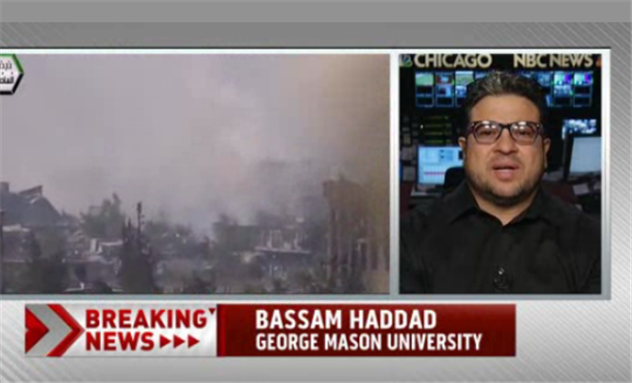ALL IN with Chris Hayes on MSNBC
Syria: The Case for War
The Senate Foreign Relations Committee held a hearing Tuesday on a U.S. military strike against Syria, in which Secretary of State John Kerry offered dire warnings about the consequences of inaction. Chris Hayes is joined by Senator Jim Rish, R-Idaho, Rep. Gerry Connolly, D-Va., and Bassam Haddad, Director of the Middle East Studies Program at George Mason University, to discuss the hearing and the resolution parameters that Congress will vote on in coming weeks.
[Transcript and Video Below]
Chris Hayes (CH): Joining me, director of the Middle East Studies Program at George Mason University. He`s a scholar who specializes in Syria. He opposes US military intervention there. And professor, my first question to you is, the argument being made largely by John Kerry and the administration is on the grounds of a humanitarian case. Essentially enforcing this international norm against the use of weapons that are as ghastly as the ones we see deployed here. Why do you not think it`s a good idea for the United States to engage in military action to enforce that norm?
Bassam Haddad (BH): Well, first of all, to push for this argument on a humanitarian level is actually quite ridiculous, considering what has taken place in the region--under our nose and our spore and continues to take place in the region--with the support of the United States of various dictatorships and support of the settler colonial state of Israel and various other forms. What needs to be discussed right now is something a lot more serious than the debate suggests.
CH: Let me interrupt. We have very similar views on American foreign policy. It also seems to be like a little bit of hiding the ball to talk in those circumstances. Whatever the sins of the American government and its participation in the region--which I`m sure you could spend a lot of time listing, many of which I would agree with you on--that does not necessarily, right, in an operational, moral, or legal sense, take away from the possibility that it would be actually beneficial to the international world order or to Syrians for the US to get involved?
BH: Okay. I mean, this is what I`m trying to get to: the devil`s advocate argument. The debate right now centers around the idea that taking action is less risky than not taking action. This way of framing the debate is actually extremely problematic and off. First of all, this kind of framing of a binary eliminates the possibility that there is another option. It actually absolves the US from taking another course of action or another choice because the debate is being framed as action versus inaction. No, there is another course of action, and that is as we have been listening to many people saying, and I`ve been saying several times on various media, that there is a solution to the conflict. As much as we think it is difficult, the United States and Russia can come together and compel all parties to the conflict--that the United States and Russia will actually potentially come to a table and create the opportunity or the circumstances for the transition.
Because let me just say this, what we are not paying attention to is that a limited strike, first of all, will not be effective. Second of all, it will make the conflict more volatile. And third of all, it forecloses any possibility of a political solution down the road. It`s basically eliminating that possibility for the sake of very limited gains that can spin out of control and bring the entire region into this conflict.
CH: Bassam Haddad, from George Mason University. Thank you so much for your time tonight I really appreciate it.
Visit NBCNews.com for breaking news, world news, and news about the economy
![[Screenshot from Chris Hayes MSNBC show \"All In.\"]](https://kms.jadaliyya.com/Images/357x383xo/ScreenShot2013-09-04at3.16.17PM.png)

















